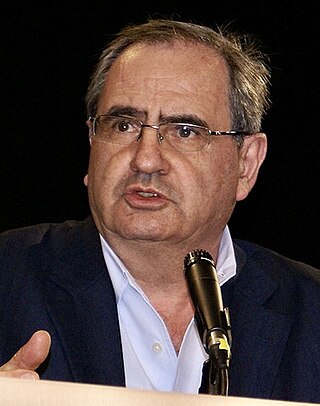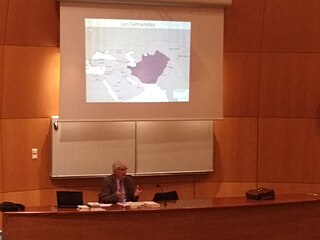
Jean-Guenolé-Marie Daniélou was a French Jesuit and cardinal, an internationally well known patrologist, theologian and historian and a member of the Académie française.

Françoise Dolto was a French pediatrician and psychoanalyst.

Jean-Noël Jeanneney is a French historian and politician. He is the son of Jean-Marcel Jeanneney and the grandson of Jules Jeanneney, both important figures in French politics.

Pierre Rosanvallon is a French historian and sociologist. He was named a professor at the Collège de France in 2001, holding the chair in modern and contemporary political history.
Jean-Pierre Azéma is a French historian.
Alain Demurger is a French historian, and a leading specialist of the history of the Knights Templar and the Crusades.

Jean Baubérot, is a French historian and sociologist specializing in sociology of religions. He is the founder of the sociology of secularism.
The Prix Guizot is an annual prize of the Académie Française, which has been awarded in the field of history since 1994 by Fondations Guizot, Chodron de Courcel, Yvan Loiseau and Eugène Piccard.
François-Régis Bastide was a French writer, diplomat, politician, and radio host.

Bernard Cottret was a French historian and literary scholar.

Events from the year 1555 in France.

Jean-Baptiste Pastré was a French banker and arms-dealer from Marseille. A merchant banker in Egypt, he founded the Anglo-Egyptian Bank in 1862. He also served on the City Council of Marseille.
Denis Bertrand Yves Crouzet is a French historian specialising in the history of the early modern period and particularly in the French Wars of Religion during the reformation. He is a professor at Paris-Sorbonne University where he holds the chair in History of the 16th Century. He is married to the historian Elisabeth Crouzet-Pavan.

Maurice Olender was a Belgian-French historian, professor at the École des hautes études en sciences sociales (EHESS) in Paris. His teaching focused in particular on the genesis of the idea of race in the nineteenth century. He also published widely on the intellectual history of the concepts of Indo-European languages and Proto-language, most importantly in his monograph Les langues du Paradis. As editor, he headed the journal Le Genre humain and La librairie du XXIe siècle at Éditions du Seuil.
John Scheid is a French historian. A specialist of ancient Rome, he has been a professor at the Collège de France since 2001.
Ronan Leprohon was a 20th-century French Breton academic historian, politician, and lifelong Breton nationalist.
François-René Tranchefort was a contemporary French musicologist.
Events from the year 1624 in France.

Jean-Pierre Arrignon was a French academic and historian. He specialized in the Middle Ages and contemporary Russia.
François Bédarida, was a French academic historian. His work centred on Victorian England and France in WWII. He made significant research contributions to the study of The Holocaust. He was a director of the Maison française in Oxford among other leadership roles.









